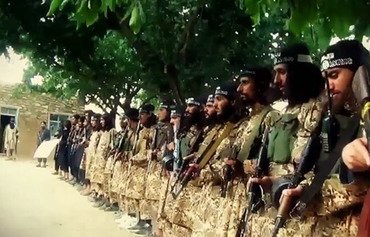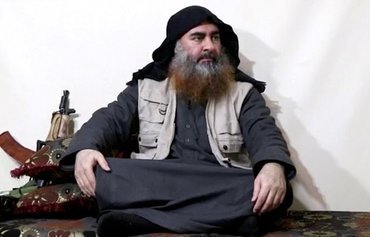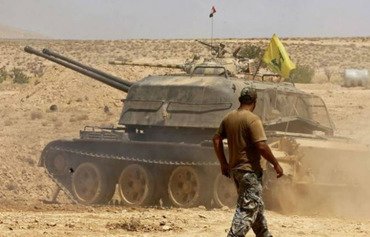The reported assassination of the so-called Mufti in Iraq of the "Islamic State of Iraq and Syria" (ISIS) is a manifestation of deep ideological disputes and divisions within the group, Syrian activists tell Diyaruna.
Saudi national Omar al-Qahtani, also known as Abu Bakr al-Qahtani, travelled to Syria in order to join ISIS in 2012, eventually rising to become the group's top "sharia official".
Al-Qahtani is believed to have been executed by ISIS elements who subscribe to the hardline ideology promoted by Saudi figure Ahmed al-Hazimi, collectively known as "Hazimis", who are known for their ultra-extremist views.
Hazimi elements largely control Deir Ezzor, according to Syrian media sources, where reports of a dispute between al-Qahtani and hardline ISIS sharia officials who follow al-Hazimi's teaching have recently come to light.
Though ISIS claimed al-Qahtani was killed in a coalition airstrike in Tal Afar, Iraq, media reports claim he was in fact executed by hardline elements of his own group on August 7th in the rural town of al-Mayadeen in Syria's Deir Ezzor.
Al-Qahtani, a 42-year-old al-Qaeda veteran, was a close associate of ISIS leader Abu Bakr al-Baghdadi, media activist Jameel al-Abed told Diyaruna.
"His most famous fatwa was the one that sanctioned fighting al-Nusra Front (ANF) and other opposition groups, especially through the use of suicide bombers," al-Abed said.
Sharp division between emirs
Word of al-Qahtani’s execution in al-Mayadeen was circulated among ISIS elements "in a way that seemed to send a message to anyone who opposes the ideas and orientations of the Hazimi faction within the group", al-Abed said.
"Political and military activists in the rural Deir Ezzor region are fully aware of the nature of the relationship between the group’s emirs and sharia officials and the existence of deep divisions between them," he said.
This has reached the point where the group’s territory has been quietly divided between the different factions that make up ISIS, he said, with each retaining its own followers and supporters.
"This also applies to al-Qahtani, whose influence had clearly diminished in the recent period," he said.
Recent reports indicated al-Qahtani had been placed under house arrest, and his movements were restricted, pursuant to a decision by a commission comprising the group’s sharia officials that answers directly to al-Baghdadi, al-Abed said.
Internal ideological disputes
This is not the first time that a sharia official or influential figure within ISIS has been executed by the group, said Syrian journalist Mohammed al-Abdullah.
This can be attributed to ideological disputes over takfir and extremism-related issues between factions within the group, he said, most notably among the Hazimis and the faction previously headed by Turki al-Binali.
The most prominent faction in the group remains the one headed by ISIS leader Abu Bakr al-Baghdadi, who seems to be content with the Hazimis, as they are in control in the Deir Ezzor region, he said.
"Despite the fact that Abu Bakr al-Qahtani was behind the issuance and circulation of the fatwa legitimising fighting ANF and the Free Syrian Army and all other opposition factions," he said, this has not won him support within ISIS in the last period.
At present, he explained, ISIS feels the need to co-operate with any group that can help it hang on to the territories it still controls for as long as possible.
First-line leaders flee
"The group’s situation in the field in Syria and Iraq will give rise to more disputes and divisions in its ranks," said retired Egyptian military officer Maj. Gen. Wael Abdul Muttalib, who specialises in extremist groups.
This is particularly likely among first-line leaders, he told Diyaruna, as they hail from various countries and adhere to different ideological strains, brought together under the umbrella of ISIS.
"Throughout the past period, everyone was preoccupied with power, influence, money and illegal trade," he said. "Now that all this is gone, liquidating the top figures has become necessary for the group."
According to various media reports, a number of top ISIS leaders have abandoned their posts, forcing the group to tighten its controls on the borders of the areas it controls in Deir Ezzor in order to prevent escapes.

!['Islamic State of Iraq and Syria' sharia official Abu Bakr al-Qahtani is believed to have been executed by hardline members of his own group in Syria's Deir Ezzor. [Photo circulated on extremist social media sites]](/cnmi_di/images/2017/09/21/9636-ISIS-leader-execution-600_384.jpg)






